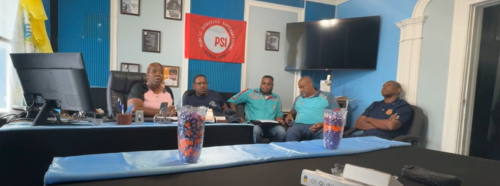 PHILIPSBURG:--- The Windward Islands Civil Servants Union/Private Sector Union (WICSU/PSU) held a press conference this afternoon to address the ongoing "go-slow" actions by two of St. Martin's pivotal emergency services, the Fire Department and the Ambulance Department. The move, initiated in response to long-standing grievances related to disrespect, inadequate facilities, and a lack of proper recognition, has significant implications for the community, particularly during the island’s highly anticipated Carnival festivities.
PHILIPSBURG:--- The Windward Islands Civil Servants Union/Private Sector Union (WICSU/PSU) held a press conference this afternoon to address the ongoing "go-slow" actions by two of St. Martin's pivotal emergency services, the Fire Department and the Ambulance Department. The move, initiated in response to long-standing grievances related to disrespect, inadequate facilities, and a lack of proper recognition, has significant implications for the community, particularly during the island’s highly anticipated Carnival festivities.
Emergency Services on "Go-Slow"
The Fire Department began its go-slow on April 17, while the Ambulance Department commenced its action today. During the press conference, WICSU President Sharon Cannegieter, alongside shop stewards from both departments, highlighted the key reasons behind the decision.
"It is sad that we had to reach this point," said Cannëgieter. She emphasized that the workers feel undervalued and disrespected despite their critical roles in ensuring public safety. "They put their lives on the line so that we can be safe, and their efforts are not acknowledged. Appreciation is not reciprocated."
Under the "go-slow," emergency responders will focus solely on critical emergencies. Routine tasks such as inspections, participation in the Carnival parade, and other non-urgent activities have been suspended. The impact is already being felt in Festival Village, a hub of Carnival celebrations, which now lacks direct support from the Fire Department, Ambulance Department, and Red Cross personnel.
Grievances and Issues Highlighted
A major point of contention is the failure to establish adequate medical facilities at Festival Village. According to Cannëgieter, the Ambulance Department has long advocated for a medical room within the village, citing years of having to attend to patients in or outside ambulances, often in rain or scorching heat.
"There was an architectural drawing prepared for a medical room," she explained. "But that has been ignored. Requests were denied, and even a container solution, which was supposed to be a temporary fix, has yet to be provided."
The absence of these facilities is not just an issue of comfort but also a matter of public safety and dignity. Cannëgieter recounted an incident where multiple individuals fell ill during Carnival festivities, forcing one patient to wait outside while another was treated in the ambulance. "Where’s privacy? Where’s the respect for medical care?" she asked.
Adding to the frustration, reports surfaced of frontline workers being denied access to VIP restrooms, asked to queue alongside regular attendees to enter the village, and even told to park emergency vehicles far from their posts.
Broader Concerns Among Emergency Workers
The Fire Department shop steward echoed these concerns, stating, "There is utter disrespect for the tools and vehicles that firefighters rely on. Trucks carrying valuable and life-saving equipment were turned away and told to park elsewhere to make room for others."
The union also drew attention to deeper systemic issues, such as delays in finalizing the function book for firefighters, which affects their roles and benefits. The Fire Department claims former employees are being denied proper recognition for their years of service due to decisions that their pensions will not account for retroactive years.
"A firefighter gave 30 years of service, and now you're telling them they don’t count. What kind of message does that send to those still serving?" asked one representative.
Criticism of SCDF and Government
The Carnival Development Foundation (SCDF) was singled out as a primary source of the disrespect experienced by emergency workers. Cannëgieter accused SCDF of failing to accommodate the basic needs of frontline workers during one of the island’s most high-profile events.
"The SCDF cannot treat these workers like they don’t matter," she said. "Carnival is heavily subsidized by government funds, and while SCDF calls the shots in Festival Village, the government must also answer these issues. After all, these workers are servants of the public and employees of the government."
She further detailed meetings and correspondence with government officials over the medical room request, saying that despite a request being sent in June 2024, no action has been taken. Ministerial assurances that the situation would improve "next year" have done little to assuage frustrations.
Impact on the Community
The go-slow threatens to disrupt more than just Carnival. With emergency services operating at reduced capacity, the broader population of St. Maarten, including visitors, could face delays in critical medical and safety responses.
"For any emergency inside the village now, people must call 911, and ambulances will only respond if available," said Sharon Cannëgieter. "If there’s an emergency elsewhere or the ambulance is occupied, people inside the village will have to wait. That’s the reality we’re facing."
The union made clear that responsibility for these consequences lies with SCDF and the government. "We are dealing with elected officials and event organizers, not animals. The disrespect needs to end," stated one shop steward.
Call for Resolution
The WICSU/PSU President called for urgent and actionable solutions. "Promises on paper will not suffice anymore," Cannëgieter stressed. "This disrespect affects not only the workers but also the residents and visitors of St. Martin. It’s time for the government and SCDF to step up, prioritize safety, and fix this."
With Carnival celebrations in full swing and tourism at its peak, the stakes are high. Until an agreement is reached and respect restored, emergency services are standing firm on their go-slow, leaving the safety and well-being of the community hanging in the balance.